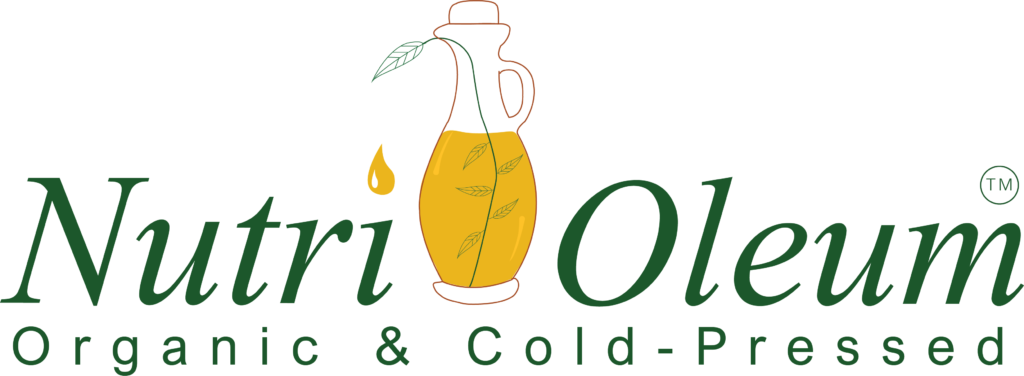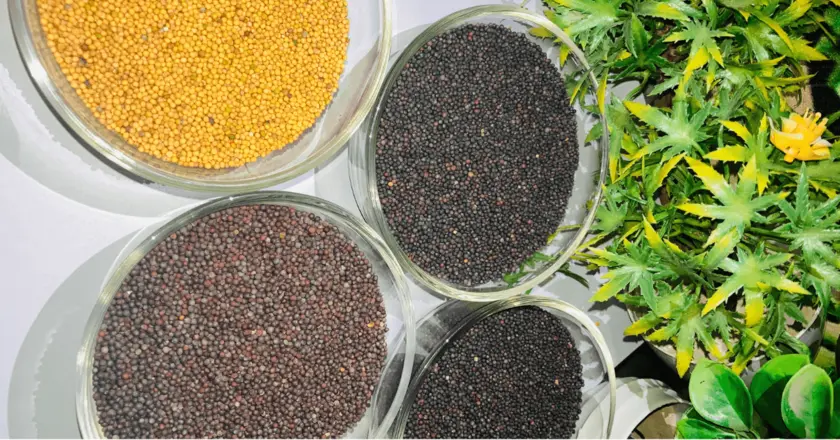Difference between black and brown Mustard seeds oil:
Pure Mustard Oil from Brown Mustard Seeds
It is known as pure mustard oil when extracting oil for cooking, specifically from brown mustard seeds. This oil’s distinctive flavor and aroma add a delightful zest to various culinary creations.
Hyola Canola Seed Oil from Black Mustard Seeds:
On the other hand, black mustard seeds are a hybrid variety developed from brown mustard seeds used for cooking. The oil extracted from black mustard seeds is often called Hylo canola seed oil. However, it’s essential to clarify that “Hyola canola seed” refers to the black mustard seed variety and the oil extracted from it rather than being a different type of oil. Hyola canola seed oil retains the distinctive flavor of mustard while offering a milder taste than pure mustard oil.
Clearing Up Misconceptions:
The myth about yellow mustard seed oil :
There is a prevalent myth that yellow mustard seed oil exists. However, yellow mustard seeds make the popular condiment yellow mustard, rather than extracting oil. Brown and black mustard seeds are the primary sources of mustard seed oils.
The Myth of Mustard Seed Oil Being Unhealthy:
Contrary to the myth, oil from Hyola Seeds contains less than 2% erucic acid, which is considered healthy for internal health. The low erucic acid content in Hyola Seed oil ensures it can be safely consumed without posing any harm.
Mustard Seed Erucic Acid Composition:
Mustard seeds naturally contain erucic acid, but the specific composition can vary depending on the variety. However, it’s important to note that commonly used mustard seed varieties, such as Hyola Seeds, have been specifically bred to significantly reduce erucic acid content, ensuring their safety for consumption.
Canola oil – is it unhealthy?
Well, like anything else, excessive consumption can have negative effects. However, when used sensibly, canola oil is an affordable cooking option rich in healthy unsaturated fats.
When used in moderation, canola oil is part of a healthy diet. Just remember to consume it sensibly, like any other food, and enjoy the benefits of its unsaturated fats.
The Journey of Creating Healthy and Flavorful Cold-Pressed Virgin Canola Oil at Nutrioleum:
Nutrioleum turns rapeseed into nutritious and delicious cold-pressed virgin canola oil. Then carefully process that preserves the oil’s health benefits and brings out its unique taste and aroma.
Growth and Harvest:
I collect originally repressed that is grown in Canada and collected from Pakistan. These seeds come from diverse regions, adding distinct characteristics to my cold-pressed virgin canola oil.
Seed Cleaning and Crushing:
The seeds are thoroughly cleaned to remove impurities. Then, they are crushed to prepare them for the cold-pressing process. I ensure the sources are not heated at any point to maintain the oil’s natural qualities.
Cold Pressing for Excellence:
Cold pressing involves gently extracting the oil by crushing the canola seeds. This mechanical method preserves the oil’s health benefits and flavors. Then press the seeds slowly, keeping the temperature below 60°C to maintain their quality. The result is cold-pressed virgin canola oil with rich color, pronounced taste, and enticing aroma.
Virgin Canola Oil:
The Healthful Choice cold-pressed virgin canola oil retains all the great health benefits of regular canola oil. However, its nutty flavor offers a unique twist, different from the familiar light and mild taste. Enjoy the added dimension of taste while reaping the nutritional advantages.
Bottling the Goodness:
After the cold-pressing process, we carefully bottle the oil, preserving its freshness and unique qualities. Each bottle contains our commitment to quality and flavor.
Experience the culinary adventure of Nutrioleum cold-pressed virgin canola oil. From carefully grown rapeseed to traditional cold-pressing methods, Nutrioleum oil offers exceptional taste, enticing aroma, and healthful benefits. Elevate your cooking with Nutrioleum cold-pressed virgin canola oil.




